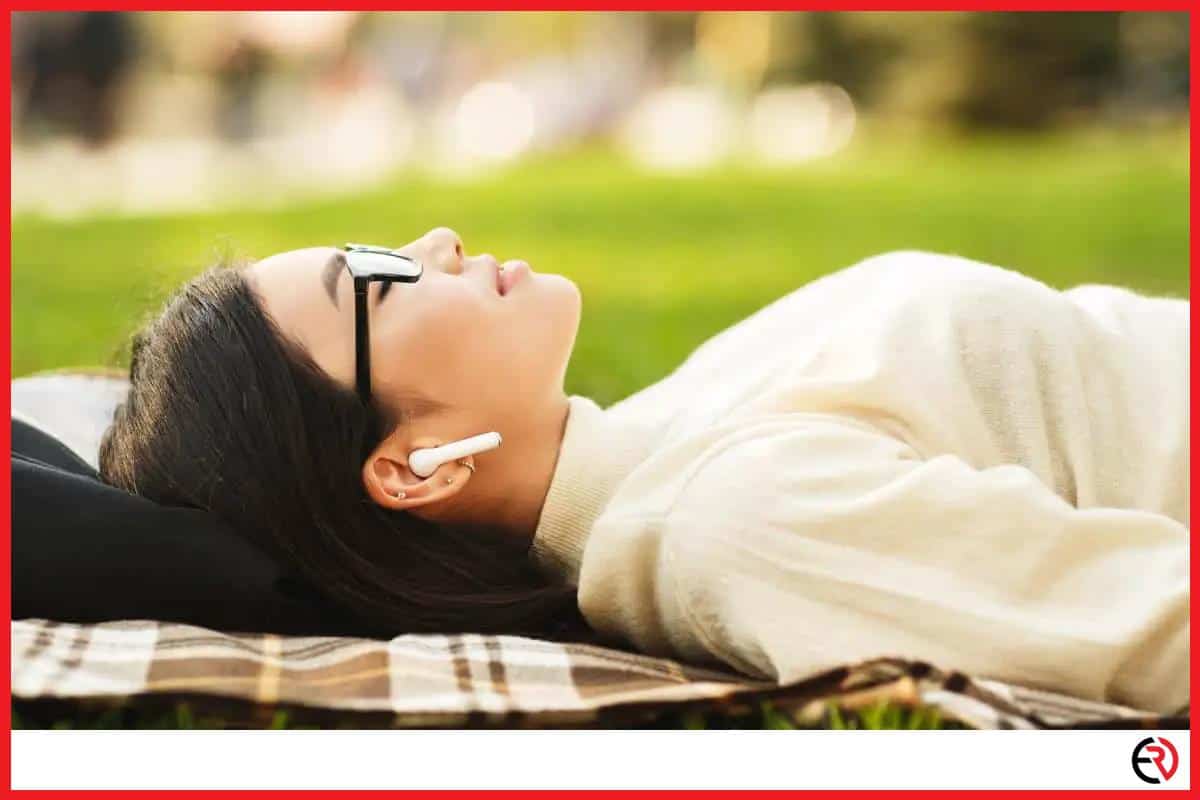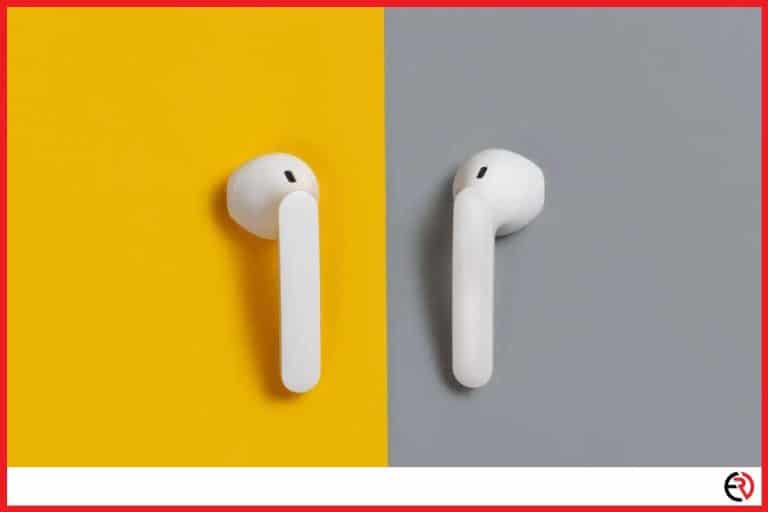Can you Sleep with AirPods? (Here are the risks)
This post may contain affiliate links which means that, if you choose to make a purchase, I may earn a small commission at no extra cost to you.
A lot of people have trouble falling asleep. Faint sounds like creaking floorboards, squeaky windows, or people coughing may trigger anxiety and wake them up in the middle of the night. You may even find it’s easier to sleep with your favorite music or podcast playing in the background. If you make that list, then you might choose to sleep with your AirPods.
However, sleeping with your AirPods may have numerous mild to severe risks. The design isn’t optimized for sleeping and it may hurt your ears. Apart from that, there are also concerns of infection and it may not help with your sleep at all.
Let’s check out the risks of sleeping with your AirPods and figure out how you can sleep in peace without them.
1. AirPods may hurt your ears
Any hard object that isn’t designed to sit within the ear canals is going to hurt your ears if you change position during sleep. If you roll on the bed, you may wake up with sore ears. The AirPods would press into your ears at a weird angle and that will cause mild discomfort in the morning. In severe cases, concentrated pressure for a prolonged period can also cause necrosis(death of skin cells) on your ears.
That’s why if you’re sleeping with AirPods, you shouldn’t try to angle them in a certain way to keep them in your ears throughout the night. That may elevate the problem and exert more pressure on your ears when you eventually roll on the bed.
2. Losing your AirPods
Even if you sleep with your AirPods every day with the most optimized position, they are going to fall out of your ears eventually. You can shrug off the mild annoyance in the morning if you find them right by your side.
On the other hand, you can also lose them under the bed or within the crevices of your mattress and have a real hard time finding them. You can also lose them permanently and that may hurt your wallet. Even with the reduced price since their launch, they cost a pretty penny compared to other true wireless earbuds in the market.
If you have participated in boxing, martial arts in any kind of intense sport, you may have cauliflower ear or other ear conditions. That shape will cause your AirPods to fall off.
Fortunately, Apple has baked in hardware and software support for tracking your AirPods. To track your AirPods:
- Check that “Find My” is set up and active on your iPhone.
- Open the Settings and tap on Find My to check if Find My is active for your phone and other paired devices.
- Open the Find My app and tap on Devices at the bottom.
- Tap on your AirPods from the list.
- The map will show you where and when your AirPods were last connected.
- Tap on Play Sound to make your AirPods ring loudly with a chime.
- You can follow the chime to locate your AirPods.
- If you have one earpiece with you and the other one is missing, tap on the “Left” or “Right” buttons on the screen to mute that piece and focus on the missing piece.
- When you find the AirPod, tap on the “Stop” button and place the AirPods back in your case.
3. Inability to sleep
Listening to music during sleep can improve your mood and even assist you in falling asleep. However, it may also have an adverse effect. Constant audio signals to your ears stimulate your brain and nervous system. This can cause elevated heart rates and trigger stress hormones that may make the sleeping problem worse.
It is more likely to happen if you listen to jazz, rock, or heavy metal that have more variations with sudden peaks and troughs, you may be unable to go to deep sleep. High volume doesn’t help either. That’s why you should lower the volume while sleeping with AirPods and listen to relaxing and soft music.
4. You may miss important sounds
When you’re sleeping with AirPods with high volume, you may miss important sounds. For instance, if someone breaks into your home, you won’t hear a loud thud or clinking noise that’s caused due to the door or broken window. You may as well miss the sound from the smoke alarm or if a family member calls for help.
5. Hearing loss
Listening to music through headphones, AirPods or anything that is alarmingly close to your ear can skew your hearing. According to the CDC, while low levels of noise aren’t a reason for concern, things get messed up after 70 dB. For reference, a whisper is around 30 dB, while a conversation takes place at 60 dB.
When you crank up the volume over 70 dB for long durations, your ears start taking damage. At a high volume or around 105 to 120 decibels, you may experience immediate damage to your ears and incur a hearing loss. You shouldn’t expose your ears to a close source of sound for a prolonged period either. The following table paints a clear picture:
| Loudness | Risk to Hearing |
| 60 dB (Average) | Negligible Damage |
| 85 dB (Loud) | Possible damage to hearing after 2 hours |
| 95 dB (Quite Loud) | Possible damage to hearing within less than an hour |
| 100 dB (Very Loud) | Possible hearing loss after 15 minutes |
| 105-110 dB (Excessively Loud) | Hearing loss within 5 minutes |
| 120 dB (Painful) | Immediate damage and possibly physical injuries |
Experts believe that noise-induced hearing loss can be prevented if earbuds are used with limitations. The recommended volume level for listening to music is around 60 percent while exposure should be less than an hour. That immediately rules out sleeping with your AirPods.
6. You may swallow the AirPods
The chances of your AirPods making their way into your mouth after you fall asleep is abysmally low. However, there have been a few cases of such incidents where people swallowed their AirPods in their sleep. You’re lucky if it passes through your digestive system. Otherwise, it may lead to surgery or other such invasive methods.
7. Ear infections
With excessive use of AirPods or any pair of earphones, ear wax starts to build up in the device and your ears. Your ears are designed to self-clean themselves and your AirPods get in the way. When earwax is built up it increases the risk of bacterial infection and can damage your ears. Your body would try to get rid of the germs with inflammation and that will cause a lot of pain.
That’s why you should limit the use of earphones. Prolonged use for seven or eight hours of sleep only increases the chances of infection and rules out sleeping with your AirPods.
8. May cause cancer
This subject requires more research and for now, there is no conclusive evidence that suggests AirPods may cause cancer. However, this topic is highly controversial and holds many people curious.
The concern comes from Radio frequencies emitted by AirPods. Like any electronic device, AirPods also emit radiofrequency (RF) radiation. While RF waves don’t directly damage DNA, according to Cancer.org studies conducted on lab rats show that prolonged exposure to RF radiation may increase the risk of certain heart tumors. However, the studies had enough limitations that didn’t allow for drawing concrete conclusions.
But that grey area would leave anyone thinking about the risk of exposure to RF waves for a third of the day while they are asleep with their AirPods. Moreover, unlike your phone that is kept away in your pants or by the bedside table, AirPods are in constant contact with your skin when you’re asleep and when you aren’t.
While the AirPods boast a SAR rating of 0.466 watts/kg that’s way below the 1.60 watts/kg set by the FDA, the testing standard doesn’t take into account that the earphones are plugged into your ears with constant contact with the skin. This has expert scientists like Dr. Jerry Phillips and his peers concerned.
How to avoid sleeping with AirPods
By now you must be aware that sleeping with AirPods may not be the optimal choice for sleeping to music or for blocking out noise. Here are the alternatives:
- Sleep Headphones – Instead of AirPods or any other pair of wireless earbuds with a sharp and protruding shape, you may try out Sleep headphones. They lie flat on your ear and won’t cause pain or damage when you roll on the bed.
- Earplugs – If you want to block out noise during your sleep, you may try sleeping with earplugs made of soft silicone. They won’t hurt your ears and can block a wide range of low and high-frequency noise.

Conclusion
While the Sleep Headphones won’t provide you an impressive sound signature like the AirPods and earplugs don’t have active noise cancellation to block ambient noise, they will bring you a decent compromise. The benefits of sleeping with your AirPods aren’t worth the long list of risks








